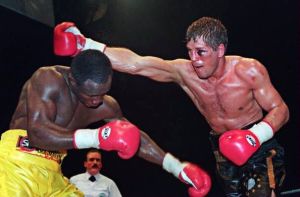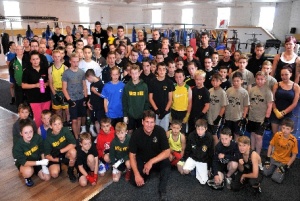Henry Wharton Interview
Henry Wharton Interview:
With the likes of James DeGale, George Groves, Rocky Fielding, and Callum Smith all competing at Super Middleweight, the division has certainly captured the public’s imagination. Such was the case in the early to mid-nineties when British boxers thrived in an exciting division.
BoxBets talks to one such character from that era, Henry Wharton. Wharton, now a proud gym owner, looks back at a career which saw him win British, Commonwealth, and European titles; face dangerous adversaries in Nigel Benn and Chris Eubank; and that elusive world title.
Henry Wharton Interview
Speaking from his boxing club in York, Henry feels he was always destined for a life in the sport: ‘I grew up around boxing, I used to watch boxing long before I started boxing. I was one of eleven children, and you can imagine how difficult that was- I had no shortage of sparring partners [laughs], but My dad, who must have seen something from a young age, would always say to me, “One day you’ll be world champion”- and he wasn’t far short. I love every second of it, I’ve grown up with boxing.’
After turning professional in 1989, Henry went on to rack up ten wins before facing Rod Carr for the vacant Commonwealth title in 1991- a match which he duly won on points. More success came the following year when he picked up the British title with a points win over the interestingly named Fidel Castro Smith.
Nigel Benn vs Henry Wharton
Often fighting in his home city of Leeds or at the Barbican centre in nearby York, Wharton was able to build up a popular following in the local area. However, it wasn’t really until 1994 that he became known to a much wider audience. This, of course, was due to his challenge for Nigel Benn’s WBC Super Middleweight title.
According to Wharton it was no easy task getting Benn to face him. ‘What people don’t know is that he avoided me for 12 months; he paid me ‘stand-aside’ money – $50,000. He didn’t fancy the fight so much obviously because I was a bit of a danger; current number one in the world at the time.’
Whatever Benn’s reasons may have been, the fight was finally agreed upon and Henry went into it full of confidence: ‘leading up to the fight absolutely fantastic preparation. We prepared in America, we stayed in America for 3 months, went then to Spain, I had a time I will never forget. We had training camp set up and sparring partners flown in, and it was ‘all of the above’. No one else did more than us- We did it all.’
Benn’s reputation as a heavy puncher was well know, and although he may not have been quite so devastating once he moved up from Middleweight, Wharton still took his power very seriously. ‘I had a tape of him when I was in America- it had twenty-six fights and twenty-six KO’s! I couldn’t find a losing one [laughs].
I realised early on that anything he hits he can knock over. And I played it pretty smart thinking that if I go out hands down and swinging wild, then you can’t win the fight from laying on the canvas! So I had to play a little bit of caution, my plan was always to come on late, come on strong towards the end, but I had just given him too much of a start.’
With the fight going the distance and Benn retaining his title with a points win, Henry feels that he went for the wrong strategy on the night, ‘it [my tactics] allowed him to box different. It allowed him to move around, because he didn’t fight me the way he fought everyone else. Ideally a 15 round fight would have suited me, because I still could have gone for a run afterwards because I was that fit.’
With a strong sense of regret, he added: ‘I know I could have done more, and it will always live with me that I could have ‘went’ earlier.’ But his mood soon lightens: ‘I feel he hit me with his best shots, but I didn’t get you properly Nigel! [laughs].’
Chris Eubank vs Henry Wharton
Although keen to face Benn in an immediate rematch, Wharton had to settle for wins over Guy Stanford and Sipho Moyo- both by knockout, before getting another title shot. In what was turning out to be the biggest year of his career, Wharton now found himself against WBO champion Chris Eubank.
Although, not as dangerous a puncher as Benn, Eubank presented Wharton with a whole new set of problems. ‘Benn should have been the more difficult for me because one punch can take you out, whereas Eubank is a counter-puncher- I played into his hands, he was really difficult for me. What I done that night, with the intention of “I’ll never do what I did against Benn”’.
‘ By that, Wharton means being overly cautious at the start. ‘It made the fight easier for him. Even though I think that fight played a big part in finishing his career, and he has admitted as much. I broke something inside him that night. Maybe I broke something inside me, because I’ll tell you- In that fight I tried so hard. After that fight I won the European title and fought so-and-so to reclaim my position as world number one, but I was never the same.’
When queried if he was ‘never the same’ psychologically or was it more physical, Henry revealed, ‘I weren’t the same. I think I lost something that night. I think because of the punishment I took, and I’m a go-getter, I tried so hard. He hit me with everything he had, and I did him. I never stopped trying because I always believed I could win, and I thought I will never leave anything again, I’ll never ‘do a Benn’ again. I’ll never come out of the ring thinking I could go for a run. I was as spent as anybody after that fight, because I never left anything, I left it all in the ring that night.’
In his autobiography, Eubank speaks very highly of Wharton, and his trainer Ronnie Davies believes that Eubank’s performance that night was among the top three of his career. Wharton also seems to have a great deal of respect for his former opponent. ‘Listen, let’s not joke about it, Eubank were fantastic on the night. I don’t think there were many super middleweights alive, at that time of his life, on that night that could have beaten him. Because he knew he had to win, which was a credit to me. I can look back now and say he had to be in that position because he trained hard, he trained hard for me. So that was good that he took me as a real threat, even though he threw it back in my face by hitting me so hard! [laughs].’
European Champion
Although 1994 didn’t bring the rewards that Wharton had hopped for, the following year he quickly returned to winning ways by claiming the vacant European title with a KO win over Mauro Galvano. Other decent names were added to his CV in Sam Storey and Vincenzo Nardiello – neither lasting the distance. His final shot at the world title would come in 1997 against the WBC champion Robin Reid.
Despite being relatively young at the time, Wharton insists that the years of making weight and giving his all in training had taken their toll. ‘If we look back to the Eubank fight, I suffered a lot with weight. The 12 stone weight division absolutely destroyed me. I used to get to 13 stone, still a stone away, and be just a shell of myself. At least I had 24 hours after weigh in, but even that were dangerous as I was so weak, weak as a kitten.’
‘I punished my body to beat Eubank, and I punished my body to beat Benn, and there was something going- I don’t know what it was, but I tried too hard. Then I think I defended the European title 3 times in quick succession, and it pushed me trying to keep making that weight.’
Henry Wharton vs Robin Reid
‘Then came the Robin Reid fight and I was really confident, I was never over confident in any shape or form, but that was my chance to be champion. I fancied myself to win the fight. But I was in the dressing room and a few things happened that day which was a bit spooky to be fair. You don’t plan for them and there are not good for your preparation.’
‘I was in the dressing room and it was as big as a shoe box, the gloves didn’t come until about thirty seconds before the fight, our music never came on, they put some other music on, so preparation wise, I was unsettled. It did upset me, it unsettled me. I never really got into it, and I think there were four or five rounds gone and I wasn’t even there, but I was playing with him.’
‘Robin Reid is a pal of mine, and whenever I see him I say, “you lost your last fights because you was old, they couldn’t lace your gloves, and that’s how I feel about you”. I’ve got to say it, I’ve just got to. The guy is a lovely guy, but I just feel that I wasn’t right for that fight, and the punches, I could see them coming but I just couldn’t get out the way of them. I couldn’t get out the way anymore. I just think that my boxing life had gone from there. I only had two fights after that and that was me retired.’
Retiring at the relatively young age of 29, Wharton says, even after letting his body rest for a couple of years, he was never tempted to make a comeback: ‘There was always offers. I think they [promoters] read between the lines and they know what fighters are like- they start wanting to get back in there, and they miss all the razzmatazz, they miss the fight, because that’s what they are, that’s what they have become, and in a certain way, that’s how they are designed, but I never did. I never once had a season off- I boxed all the way through from the amateurs without a season off, and making the weight was always tough’.
Henry Wharton Gym Owner
Wharton did eventually return to boxing, but this time as a trainer and gym owner. With his gym located in York, where he is now based, he seems very happy with the way things are going: ‘Things are fantastic, you can appreciate that we put 12 months into renovating the place.
I saw this great opportunity in the place- We want to be as good as everybody else, if not better- and that’s not taking anything away from anyone else, but we’ve got ambition. And that ambition will stay long, long in my heart because we’ve got dedicated fighters and a good team of coaches which is a great help and I can only thank them, and long may it continue.’
Wharton, it appears, has taken the same view on coaching as the great Freddie Roach- that is, don’t try to impose a particular style on a boxer, but instead work to his strengths. ‘Every individual is different, if there are two guys in here that are 6’4” they might be completely different in style, and I’ve got to make the best of them and I might not be training them both the same, but I’ll make the best of them, so I’ve got to find a way to make the best of each individual.’
‘You have a look at them and then you start changing from there, because they might already do things good in the first place. You work to their strengths and the weaknesses you work harder at. This has brought me result after result.’
At the moment Henry has a decent stable of amateur fighters, and his club even host boxing shows in their own gym giving his boxers real home advantage. Although Henry already seems to have one eye on coaching at professional level. ‘We got some good future prospects and we want them to keep going and be by their side and say “we got you there”. We are an amateur boxing club and if or when they do fancy going pro, well, if ever they ask us to go pro with them, then we’ll be there to take them to the next level.’
In a final moment of reflection, Henry seems happy with what he achieved in boxing. ‘I don’t toss-and-turn at night thinking “should I? Could I? Would I?” No, I think I did alright- I can go out and say, “I’m happy with what I did”. I had a chance and I took my chances. I’ll tell you what it is, to fight for the world title was always a dream of my life which I achieved.
‘And aside of that, to win titles was always a great thing to me and I was never beaten for any title that I owned. Looking back I had a fantastic career and a fantastic life doing it. If only I could have won that world title that would have been it. But if I can put all my trials and tribulations in a nut shell, dedicate my life to coaching others, hopefully, if I can produce someone and they get the opportunity, I won’t let mistakes happen that happened to me.’















